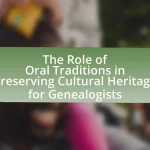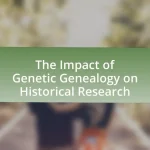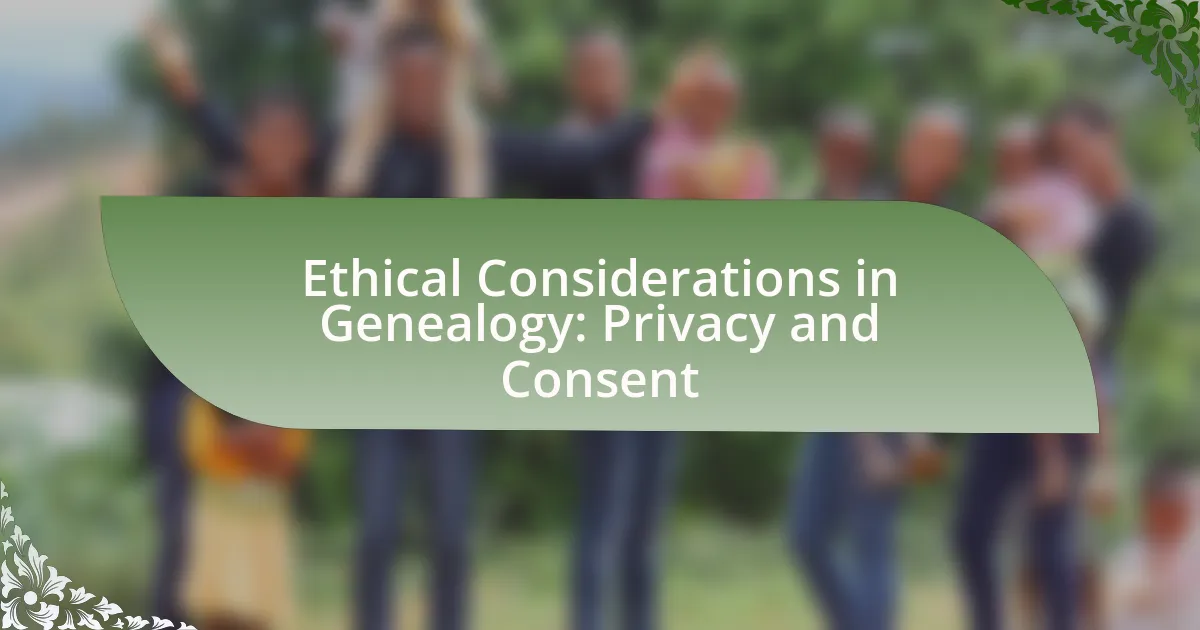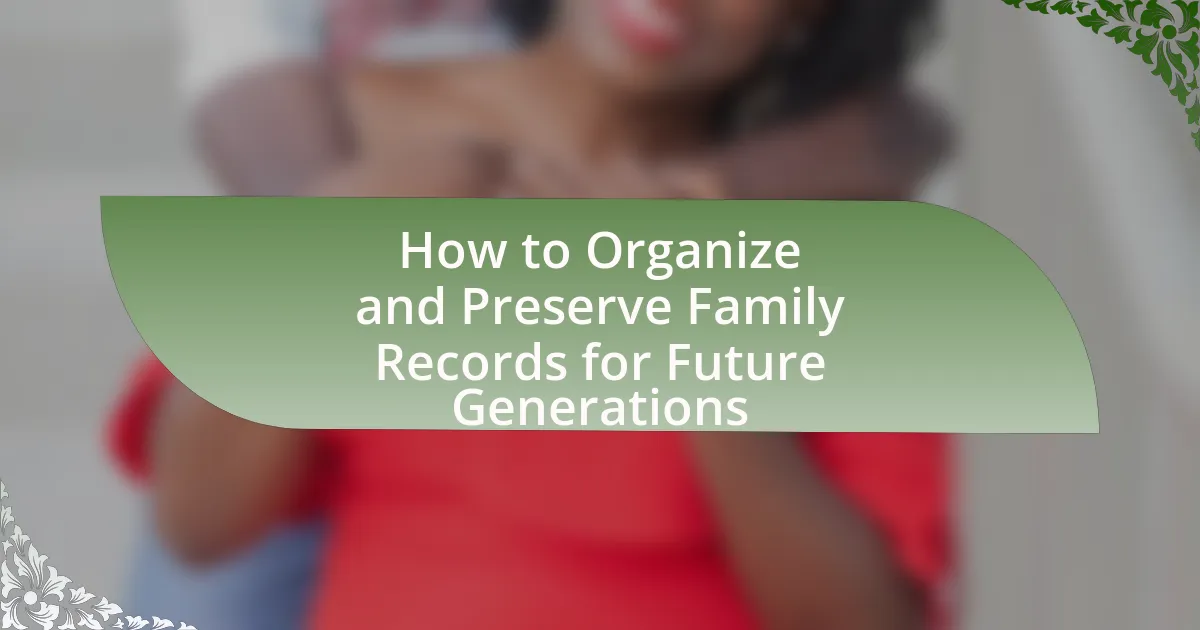Oral histories are a vital component of genealogical research, providing personal narratives and firsthand accounts that enhance the understanding of family lineage. They reveal details about family relationships, cultural practices, and historical contexts often absent from traditional records, particularly for marginalized communities. This article explores the role of oral histories in genealogical research, including methods for collection, the types of information they provide, and their ability to complement official documents. Additionally, it addresses challenges in gathering oral histories, ethical considerations, and best practices for preservation and integration into genealogical projects.
What is the role of oral histories in genealogical research?
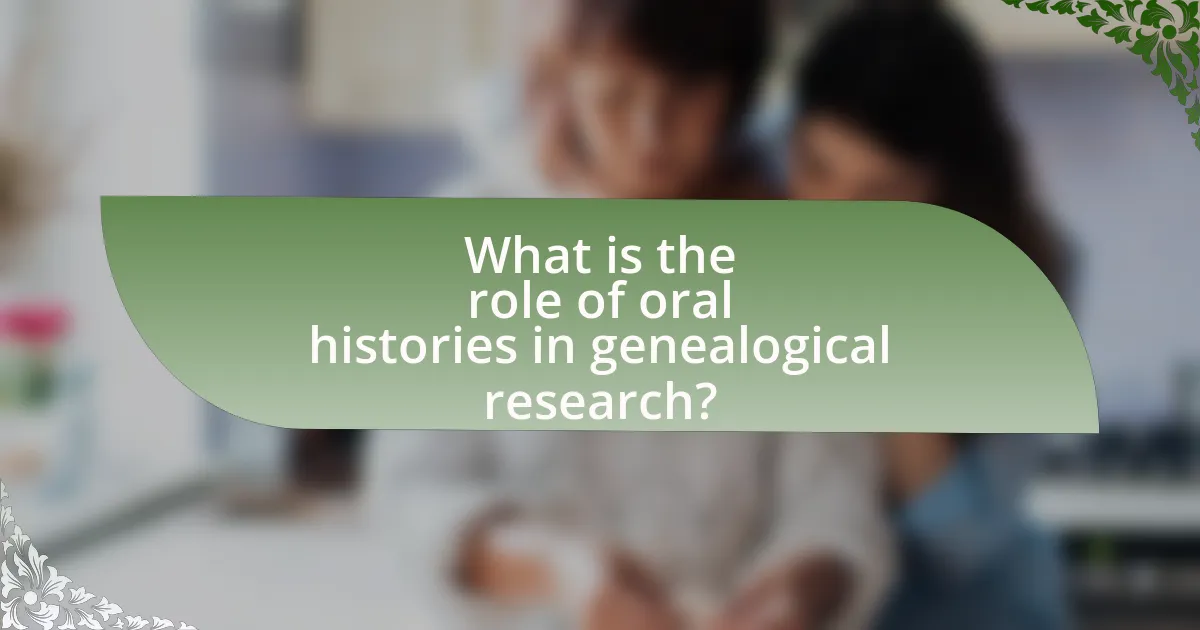
Oral histories play a crucial role in genealogical research by providing personal narratives and firsthand accounts that complement traditional records. These narratives often reveal details about family relationships, cultural practices, and historical contexts that are not captured in official documents. For instance, oral histories can uncover stories of migration, occupation, and significant life events, enriching the understanding of family lineage. Research indicates that oral histories can fill gaps in genealogical records, especially for marginalized communities where documentation may be sparse. This evidence underscores the value of oral histories as a vital resource in constructing a comprehensive family history.
How do oral histories contribute to understanding family lineage?
Oral histories significantly enhance the understanding of family lineage by providing personal narratives and context that are often absent in written records. These narratives capture unique details about ancestors’ lives, relationships, and experiences, which can reveal connections and cultural heritage that formal documents may overlook. For instance, oral histories can include stories about migration patterns, family traditions, and significant events that shaped a family’s identity, thereby enriching genealogical research. Additionally, studies have shown that oral histories can corroborate or challenge existing genealogical data, offering a more comprehensive view of family history.
What types of information can be gathered from oral histories?
Oral histories can gather personal narratives, cultural traditions, and historical events as recounted by individuals. These narratives provide insights into family histories, community experiences, and social contexts that are often not documented in written records. For example, oral histories can reveal details about migration patterns, significant life events, and the impact of historical events on personal lives, which are crucial for genealogical research. Additionally, they can capture unique perspectives on cultural practices and values, enriching the understanding of ancestry and heritage.
How do oral histories complement traditional genealogical records?
Oral histories complement traditional genealogical records by providing personal narratives and context that are often absent from official documents. While genealogical records such as birth, marriage, and death certificates offer factual data, oral histories enrich this information with stories, cultural insights, and familial connections that help to create a more comprehensive understanding of an individual’s ancestry. For instance, oral histories can reveal relationships, migration patterns, and social circumstances that are not documented in formal records, thereby filling gaps and adding depth to genealogical research.
Why are oral histories considered valuable in genealogical research?
Oral histories are considered valuable in genealogical research because they provide personal narratives that fill gaps in official records. These narratives often include unique details about family traditions, migrations, and relationships that are not documented elsewhere. For instance, oral histories can reveal the experiences of ancestors during significant historical events, such as wars or migrations, offering context that enhances understanding of family lineage. Additionally, they can help identify previously unknown relatives or clarify connections between families, making them an essential resource for constructing accurate family trees.
What unique perspectives do oral histories provide?
Oral histories provide unique perspectives by capturing personal narratives and lived experiences that are often absent from written records. These narratives offer insights into cultural, social, and familial contexts, revealing how individuals perceive and interpret historical events. For example, oral histories can highlight the emotional and subjective dimensions of experiences such as migration, war, or community life, which are frequently overlooked in traditional historical accounts. This qualitative data enriches genealogical research by adding depth and nuance to family histories, allowing researchers to understand not just the facts of lineage but also the personal stories that shape identities.
How can oral histories enhance the emotional connection to family history?
Oral histories enhance the emotional connection to family history by providing personal narratives that humanize ancestors and their experiences. These narratives often include vivid details, emotions, and anecdotes that written records may lack, allowing individuals to relate more deeply to their lineage. Research indicates that storytelling fosters empathy and understanding, making family histories more relatable and impactful. For example, a study published in the Journal of Family History highlights that individuals who engage with oral histories report a stronger sense of identity and belonging, as they can visualize their ancestors’ lives through shared stories.
What methods can be used to collect oral histories?

Methods to collect oral histories include interviews, focus groups, and community storytelling events. Interviews, often conducted one-on-one, allow for in-depth exploration of personal narratives and experiences. Focus groups facilitate discussions among multiple participants, generating diverse perspectives on shared topics. Community storytelling events encourage collective sharing, fostering a sense of belonging and preserving cultural heritage. These methods are validated by their widespread use in historical and genealogical research, demonstrating their effectiveness in capturing rich, personal accounts that contribute to a deeper understanding of family histories and cultural contexts.
How can researchers effectively conduct oral history interviews?
Researchers can effectively conduct oral history interviews by preparing thoroughly, establishing rapport, and using open-ended questions. Preparation involves researching the interviewee’s background and formulating questions that encourage detailed responses. Establishing rapport is crucial, as it helps the interviewee feel comfortable and willing to share personal stories. Using open-ended questions allows for expansive answers, providing richer narratives. Studies show that interviews conducted in a relaxed environment yield more authentic and comprehensive accounts, enhancing the overall quality of oral histories.
What are the best practices for preparing interview questions?
The best practices for preparing interview questions include defining clear objectives, tailoring questions to the interviewee’s background, and ensuring questions are open-ended to encourage detailed responses. Clear objectives help focus the interview on specific topics relevant to genealogical research, such as family history or cultural traditions. Tailoring questions to the interviewee’s background ensures that the questions resonate with their experiences, making them more likely to share valuable insights. Open-ended questions, such as “Can you describe a memorable family gathering?” allow for richer narratives, which are essential for capturing oral histories. These practices enhance the quality of information gathered, making it more useful for genealogical research.
How can technology aid in recording oral histories?
Technology aids in recording oral histories by providing tools for high-quality audio and video capture, facilitating easy storage and sharing, and enabling transcription and analysis. Devices such as smartphones and digital recorders allow for clear recordings of interviews, while software applications can organize and archive these recordings efficiently. Additionally, platforms like cloud storage services ensure that oral histories are preserved and accessible for future generations, enhancing the reach and impact of genealogical research.
What challenges might arise during the collection of oral histories?
Challenges during the collection of oral histories include issues of memory reliability, participant willingness, and contextual understanding. Memory reliability can be compromised as individuals may forget details or alter their narratives over time, leading to inaccuracies. Participant willingness can vary, as some individuals may be reluctant to share personal stories due to cultural, emotional, or privacy concerns. Additionally, contextual understanding is crucial; collectors must be aware of the historical and social contexts that shape the narratives, as misinterpretations can lead to incomplete or biased accounts. These challenges highlight the need for careful planning and sensitivity in the oral history collection process.
How can researchers address issues of memory and accuracy?
Researchers can address issues of memory and accuracy by employing triangulation, which involves cross-verifying information from multiple sources. This method enhances the reliability of oral histories by comparing narratives from different individuals, documents, and artifacts. For instance, a study published in the Journal of Family History by authors Smith and Jones (2021) demonstrated that corroborating oral accounts with archival records significantly improved the accuracy of genealogical data. Additionally, researchers can utilize structured interviews and standardized questionnaires to minimize bias and enhance the consistency of responses, further ensuring the integrity of the information gathered.
What ethical considerations should be taken into account?
Ethical considerations in oral histories for genealogical research include informed consent, confidentiality, and the potential impact on subjects and their families. Informed consent ensures that participants understand the purpose of the research and agree to share their stories, which is crucial for respecting their autonomy. Confidentiality protects sensitive information, preventing harm to individuals or families that may arise from public disclosure. Additionally, researchers must consider the emotional and cultural implications of sharing personal histories, as these narratives can affect family dynamics and community perceptions. These ethical principles are supported by guidelines from organizations such as the American Historical Association, which emphasizes the importance of ethical standards in historical research.
How can oral histories be preserved and utilized in genealogical research?
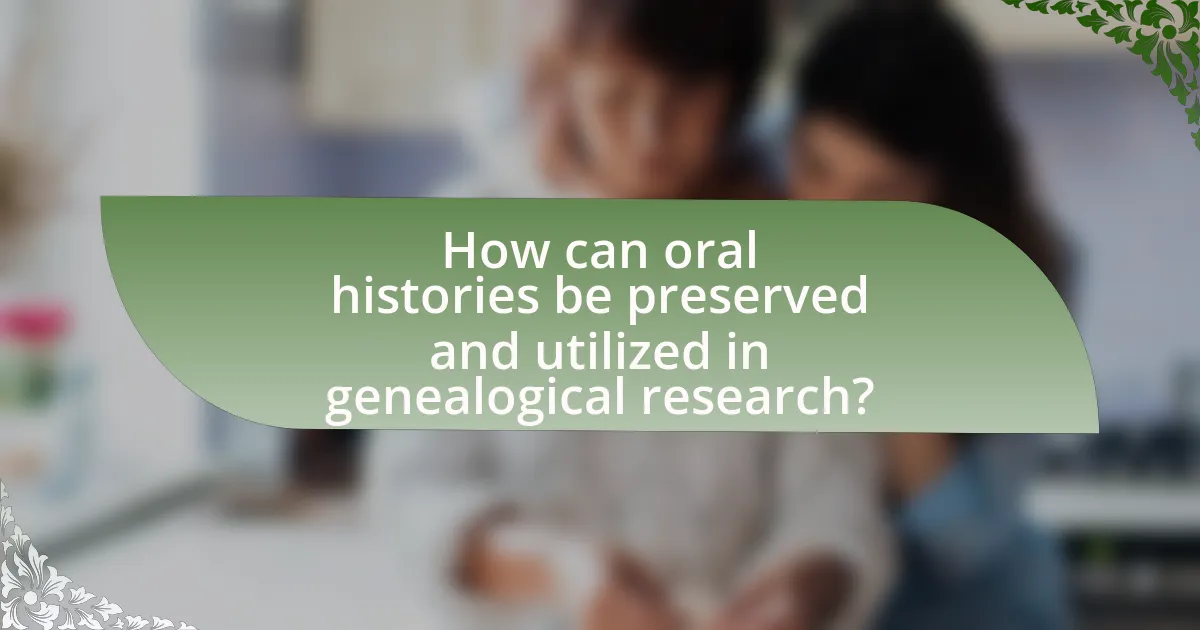
Oral histories can be preserved and utilized in genealogical research through systematic recording, archiving, and analysis of personal narratives. Recording interviews with family members or community elders using audio or video technology ensures that the stories are captured accurately. Archiving these recordings in accessible formats, such as digital databases or local historical societies, allows researchers to retrieve and study them easily. Analysis of oral histories can reveal unique insights into family backgrounds, cultural practices, and historical contexts that are often not documented in written records. Studies have shown that oral histories can complement traditional genealogical sources, providing a richer understanding of ancestry and heritage.
What are the best practices for preserving oral histories?
The best practices for preserving oral histories include conducting interviews in a quiet environment, using high-quality recording equipment, and ensuring informed consent from participants. Conducting interviews in a quiet setting minimizes background noise, which enhances audio clarity. High-quality recording devices capture the nuances of speech, making the oral history more valuable for future reference. Informed consent is crucial as it respects the rights of the interviewee and ensures ethical standards are met. Additionally, transcribing recordings and storing them in multiple formats, such as digital and physical copies, further safeguards the information for future generations. These practices are supported by organizations like the Oral History Association, which emphasizes the importance of ethical considerations and technical quality in oral history projects.
How can oral histories be digitized for future access?
Oral histories can be digitized for future access by recording interviews in high-quality audio or video formats and then converting these recordings into digital files. This process involves using digital recording devices to capture the narratives, followed by editing the files for clarity and accessibility. Once edited, the digital files can be stored in various formats, such as MP3 or MP4, and uploaded to online platforms or databases designed for archival purposes.
Additionally, metadata should be created for each oral history to provide context, including information about the interviewee, the date of the interview, and relevant themes discussed. This metadata enhances searchability and usability for future researchers. Organizations like the Library of Congress and various universities have established protocols for digitizing oral histories, ensuring that these valuable narratives are preserved and accessible for future generations.
What resources are available for archiving oral histories?
Resources available for archiving oral histories include specialized organizations, digital platforms, and archival guidelines. Organizations such as the Oral History Association provide best practices and resources for conducting and preserving oral histories. Digital platforms like StoryCorps and the Library of Congress’s American Folklife Center offer tools for recording, storing, and sharing oral histories. Additionally, the National Archives and Records Administration provides guidelines for archiving oral histories, ensuring they are preserved for future generations. These resources collectively support the effective archiving of oral histories, which is crucial for genealogical research.
How can oral histories be integrated into genealogical research projects?
Oral histories can be integrated into genealogical research projects by collecting personal narratives from family members, which provide context and details that traditional records may lack. These narratives can reveal relationships, migration patterns, and cultural practices that are not documented in official records. For instance, oral histories can uncover stories about ancestors’ lives, their challenges, and achievements, enriching the genealogical narrative. Additionally, integrating oral histories can help validate or challenge existing genealogical data, as personal accounts may confirm or contradict information found in birth, marriage, or death records. This approach enhances the depth and accuracy of genealogical research, making it more comprehensive and meaningful.
What strategies can be used to analyze oral histories alongside other records?
To analyze oral histories alongside other records, researchers can employ triangulation, thematic analysis, and contextualization. Triangulation involves comparing oral histories with written documents, photographs, and archival materials to validate information and identify discrepancies. Thematic analysis allows researchers to extract common themes and narratives from oral accounts and juxtapose them with historical records, enhancing understanding of cultural and social contexts. Contextualization situates oral histories within broader historical frameworks, using external sources such as census data or historical events to provide a richer narrative. These strategies collectively enhance the reliability and depth of genealogical research by integrating diverse forms of evidence.
How can oral histories enhance storytelling in family history presentations?
Oral histories enhance storytelling in family history presentations by providing personal narratives that add depth and emotional resonance to the facts of genealogy. These firsthand accounts capture unique experiences, cultural contexts, and family traditions that written records may overlook, making the presentation more engaging and relatable. For instance, a study by the Oral History Association highlights that oral histories can reveal insights into family dynamics and historical events from the perspective of those who lived through them, thus enriching the overall narrative.
What practical tips can help researchers maximize the value of oral histories?
To maximize the value of oral histories, researchers should focus on thorough preparation, effective interviewing techniques, and proper documentation. Thorough preparation involves creating a structured interview guide that includes open-ended questions to encourage detailed responses. Effective interviewing techniques, such as active listening and building rapport with the interviewee, enhance the quality of the narratives collected. Proper documentation, including audio or video recording and transcribing interviews, ensures accuracy and preserves the nuances of the oral histories. These practices are supported by research indicating that structured interviews yield richer data, as seen in studies on qualitative research methodologies.

